-
ORIGINAL ARTICLE12-04-2023
“Fala-M@no-COVID-19”: technological development of a health navigation program for men during the pandemic
Revista Brasileira de Enfermagem. 2023;76(6):e20220534
Abstract
ORIGINAL ARTICLE“Fala-M@no-COVID-19”: technological development of a health navigation program for men during the pandemic
Revista Brasileira de Enfermagem. 2023;76(6):e20220534
DOI 10.1590/0034-7167-2022-0534
Views0See moreABSTRACT
Objective:
to develop a care-educational technology similar to a health navigation program for men during the COVID-19 pandemic.
Methods:
a methodological and qualitative study of a care-educational technology of health navigation program, structured by Program Development Cycle, with 16 patient navigators and 10 professional navigators. It used reflective thematic content analysis and an adaptation model for data processing.
Results:
the ; navigation program was developed by: I) Observation of reality, problem mapping, needs assessment: content selection, creation of domains and questions; II) Theoretical-conceptual and methodological definition, creation of product under the elaboration of care plans, based on theory, process and taxonomies by a flowchart of operationalization of actions; and III) Self-assessment: qualitative research with professional navigators.
Final considerations:
the technology developed, with theoretical and methodological support, allowed to derive a viable navigation program compatible with reality based on the audience’s needs.
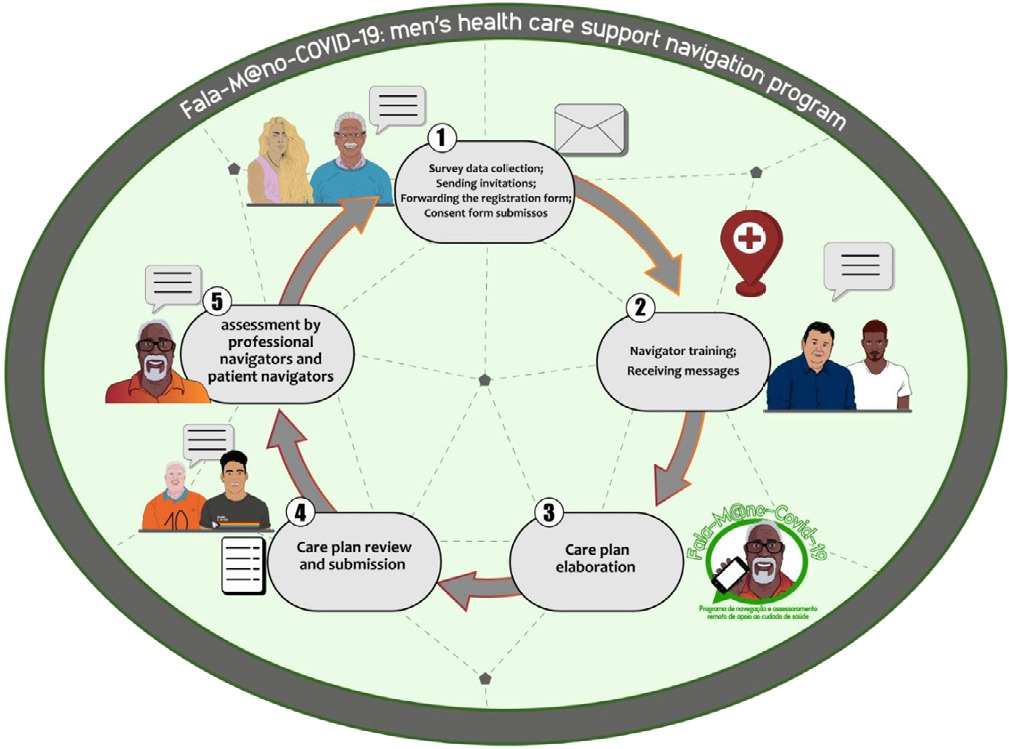
-
ORIGINAL ARTICLE12-04-2023
Social representation of young people in higher education about sexually transmitted infections
Revista Brasileira de Enfermagem. 2023;76(6):e20220406
Abstract
ORIGINAL ARTICLESocial representation of young people in higher education about sexually transmitted infections
Revista Brasileira de Enfermagem. 2023;76(6):e20220406
DOI 10.1590/0034-7167-2022-0406
Views0See moreABSTRACT
Objective:
to analyze the social representations about sexually transmitted infections elaborated by undergraduate students.
Methods:
a descriptive, qualitative study, in the light of the structural approach of Social Representation Theory, carried out with 160 young undergraduate students, in the second half of 2019, in the city of Rio de Janeiro. Data were collected using a sociodemographic characterization questionnaire, knowledge and practices for preventing sexually transmitted infections, analyzed using descriptive statistics and a form of free evocations with the inducing term STD, analyzed using prototypical and similarity analysis.
Results:
the representation’s possible central nucleus is composed of lexicons aids, disease and HIV; the peripheral system by syphilis, sex, condoms, gonorrhea, prevention, infection, carelessness, HPV, herpes, ignorance, treatment, fear, unprotected-sex and danger.
Final considerations:
social thinking about sexually transmitted infections is characterized by their recognition as diseases, which require barrier prevention measures, associating with unsafe sexual practices that arouse fear.

-
12-04-2023
The Medical Healing of Souls: a strategy for welcoming post-pandemic mental health
Revista Brasileira de Enfermagem. 2023;76(6):e20220331
Abstract
The Medical Healing of Souls: a strategy for welcoming post-pandemic mental health
Revista Brasileira de Enfermagem. 2023;76(6):e20220331
DOI 10.1590/0034-7167-2022-0331
Views0See moreABSTRACT
Objective:
to reflect on the applicability of the Medical Healing of Souls (MHS) by health professionals as a welcoming strategy in post-pandemic mental health.
Methods:
a theoretical and reflective study, based on Viktor Frankl’s philosophy, based on the book “The Doctor and the Soul, From Psychotherapy to Logotherapy” and scientific literature.
Results:
the study was structured in two discursive approaches: MHS in the field of health; The applicability of MHS in post-pandemic mental health care.
Final considerations:
MHS can be used in mental health care, in health emergencies, promoting a more humane performance of health professionals, facilitating the integration of inevitable suffering into a meaningful life.
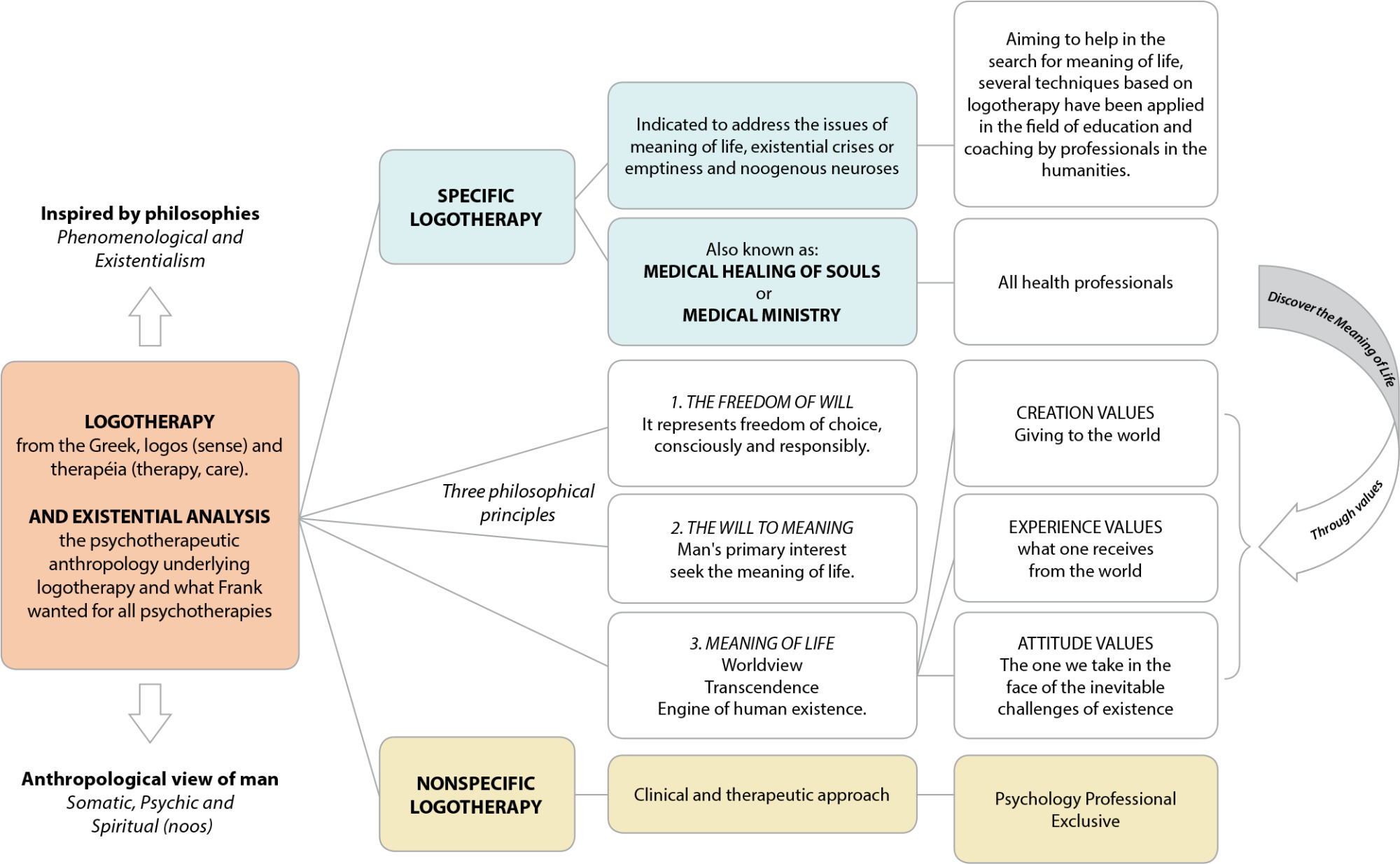
-
ORIGINAL ARTICLE12-04-2023
Translation, cross-cultural adaptation and validity study of the “Play Nicely Program: The Healthy Discipline Handbook” for use in Brazil
Revista Brasileira de Enfermagem. 2023;76(6):e20220281
Abstract
ORIGINAL ARTICLETranslation, cross-cultural adaptation and validity study of the “Play Nicely Program: The Healthy Discipline Handbook” for use in Brazil
Revista Brasileira de Enfermagem. 2023;76(6):e20220281
DOI 10.1590/0034-7167-2022-0281
Views0See moreABSTRACT
Objective:
to describe the translation, cross-cultural adaptation and validity process of the “Play Nicely Program: The Healthy Discipline Handbook” for use in Brazil.
Methods:
a methodological study that followed the translation, back-translation, expert committee assessment, and pre-test steps. The Content Validity Index (CVI) was calculated for both the judge population and the pre-test population. Four translators, seven expert judges in the field of child health and thirty participants in the pre-test, including parents, teachers and healthcare professionals, participated in the study.
Results:
in experts’ analysis (98.4%), a value of 100% of adequate assessments was obtained, and in the target population’s analysis (89.5%), there were 100% of adequate assessments. In both analyses, suggested adaptations were made.
Conclusios:
cross-cultural adaptation and content validity into Brazilian Portuguese of the “Play Nicely Program: The Healthy Discipline Handbook” were considered adequate for application in the target population.

-
ORIGINAL ARTICLE12-04-2023
Assessment of the components of sarcopenia and quality of life perceived of individuals on hemodialysis
Revista Brasileira de Enfermagem. 2023;76(6):e20220677
Abstract
ORIGINAL ARTICLEAssessment of the components of sarcopenia and quality of life perceived of individuals on hemodialysis
Revista Brasileira de Enfermagem. 2023;76(6):e20220677
DOI 10.1590/0034-7167-2022-0677
Views1See moreABSTRACT
Objectives:
to evaluate the prevalence of sarcopenia in individuals aged 50 years or older on hemodialysis; to verify the association between sarcopenia and sociodemographic, clinical, anthropometric factors, components of sarcopenia and quality of life (QoL); and to correlate the components of sarcopenia with QoL.
Methods:
Participated 83 individuals on hemodialysis. Sarcopenia was established according to the current European consensus. Dynamometry to determine strength, calf circumference (CC) and appendicular skeletal muscle mass index (ASMMI) to obtain muscle mass and gait speed (GS) for physical performance. For QoL used the WHOQOL-bref.
Results:
the prevalence of sarcopenia was 32.6% (CC) and 18.1% (ASMMI). There was no association between sarcopenia and QoL. Both handgrip strength (r=0.25) and GS (r=0.36) showed a correlation with physical domain.
Conclusions:
sarcopenia was expressive, and the aspects of functionality determine the physical impairment in this population.
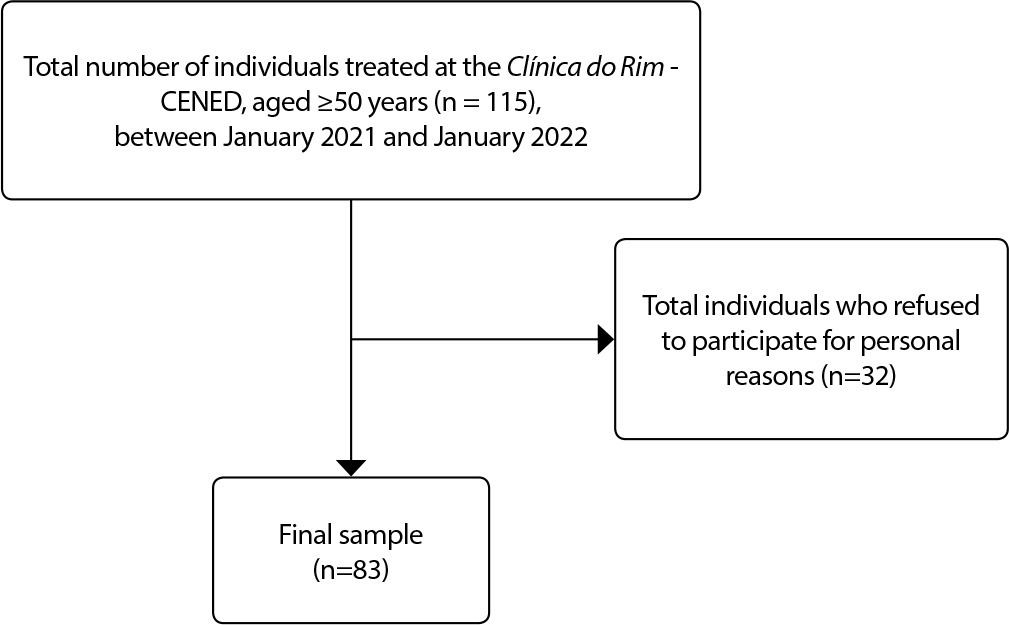
-
ORIGINAL ARTICLE12-04-2023
Effects of auriculotherapy on anxiety and biomarkers in Primary Health Care: a clinical trial
Revista Brasileira de Enfermagem. 2023;76(6):e20220728
Abstract
ORIGINAL ARTICLEEffects of auriculotherapy on anxiety and biomarkers in Primary Health Care: a clinical trial
Revista Brasileira de Enfermagem. 2023;76(6):e20220728
DOI 10.1590/0034-7167-2022-0728pt
Views0See moreABSTRACT
Objective:
to assess the effects of auriculotherapy on anxiety and brain-derived neurotrophic factor (BDNF), neuron-specific enolase (NSE) and S100 calcium-binding protein B (S100B) serum levels in adults assisted in Primary Health Care.
Methods:
a pre-experimental pilot clinical trial. Information was obtained from 19 patients using the State-Trait Anxiety Inventory (STAI) and analysis of BDNF, NSE and S100B serum levels.
Results:
the pre-intervention anxiety score in the IDATE-Trait was 52.11±6.691 (CV 12.84%) and the assessment after auriculotherapy was significantly lower (43.72±8.141; CV 18.62%; P=0.0007). S100B levels were significantly reduced after auriculotherapy (from 64.03±72.18 to 54.03±68.53 pg/mL; CV 126.8%; P=0.0023).
Conclusion:
auriculotherapy effectively reduced anxiety levels. It proved to be safe and easy to apply, allowing nurses to perform this technique autonomously. A reduction of S100B was also evidenced, demonstrating possible prevention of neuronal damage.
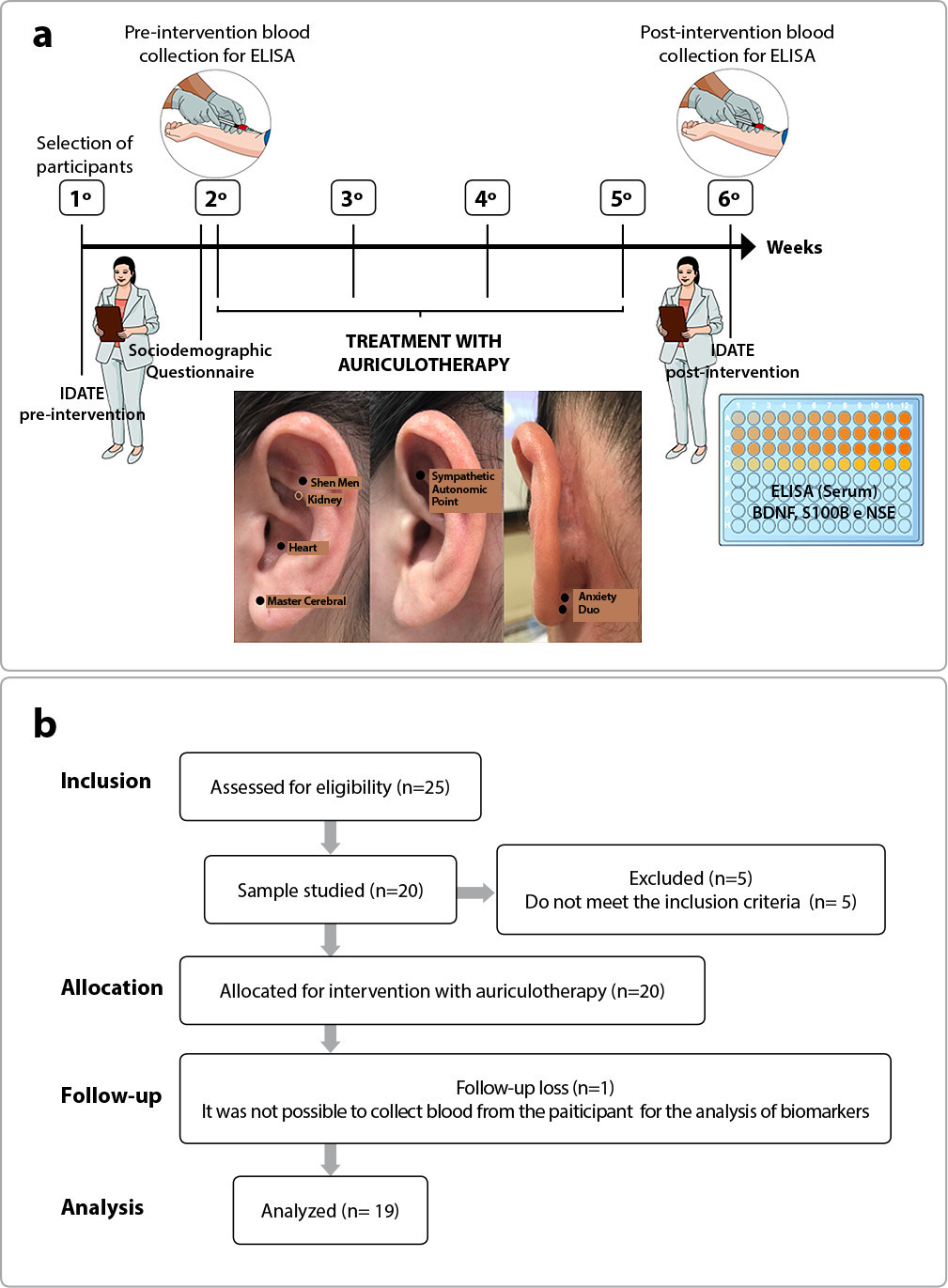
-
ORIGINAL ARTICLE12-04-2023
Leadership Competencies of the Medical-Surgical Nursing Specialist Nurse
Revista Brasileira de Enfermagem. 2023;76(6):e20220721
Abstract
ORIGINAL ARTICLELeadership Competencies of the Medical-Surgical Nursing Specialist Nurse
Revista Brasileira de Enfermagem. 2023;76(6):e20220721
DOI 10.1590/0034-7167-2022-0721
Views0See moreABSTRACT
Objective:
To identify the leadership competencies of Medical-Surgical Nursing Specialist Nurses.
Methods:
A quantitative, descriptive study using the Leadership Competencies Questionnaire. 311 Portuguese Medical-Surgical Nursing Specialist Nurses participated. Data analysis involved descriptive and inferential statistical analysis using the Statistical Package for Social Sciences (SPSS), version 22.0.
Results:
Study participants had an above-average self-perception on the scale (mean = 3.5) in all leadership roles, recognizing their leadership competencies. The leadership competencies of Medical-Surgical Nursing Specialist Nurses are balanced across all roles: Mentor (5.80 ± 1.02); Coordinator (5.53 ± 0.86); Facilitator (5.38 ± 1.04); Innovator (5.34 ± 0.88); Director (5.31 ± 1.10); Producer (5.30 ± 0.98); Monitor (5.15 ± 1.00); Corrector (4.79 ± 1.29)
Conclusions:
Specialized nursing practice enhances nurses’ self-perceived leadership competencies. Nurses see themselves as leaders focused on internal support and facilitation of collective effort and opportunities for skill development.
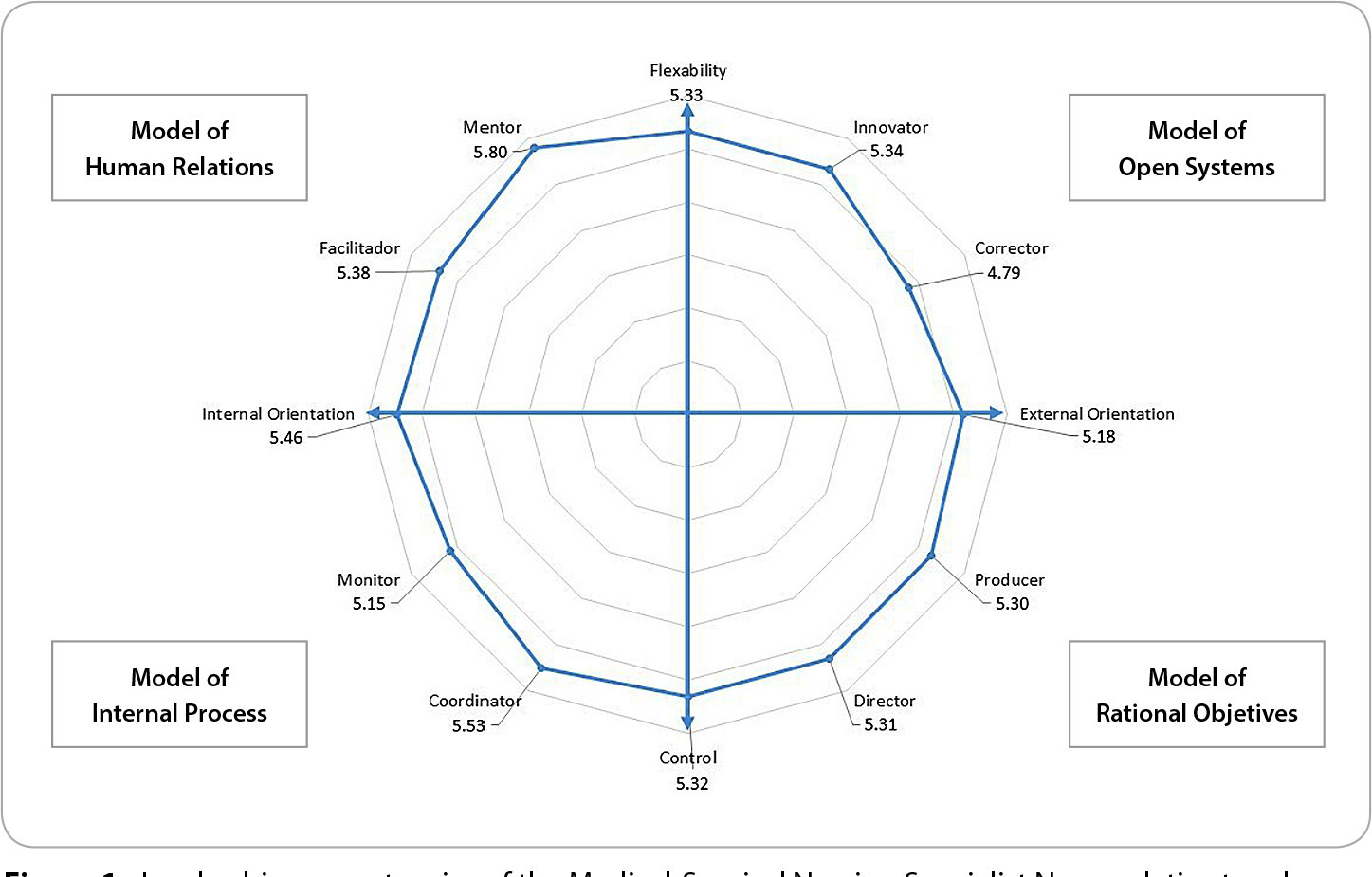
-
ORIGINAL ARTICLE12-04-2023
Feelings about birth by a group of high-risk pregnant women
Revista Brasileira de Enfermagem. 2023;76(6):e20230059
Abstract
ORIGINAL ARTICLEFeelings about birth by a group of high-risk pregnant women
Revista Brasileira de Enfermagem. 2023;76(6):e20230059
DOI 10.1590/0034-7167-2023-0059
Views0See moreABSTRACT
Objective:
to understand feelings about birth among a group of high-risk pregnant women.
Method:
a descriptive and qualitative study, using Alfred Schütz’s social phenomenology as a philosophical theoretical framework. The study included 25 pregnant women undergoing high-risk prenatal care. The interview had the following guiding questions: tell me about your feelings regarding the moment of birth/childbirth; How do you deal with the high-risk diagnosis? What are your expectations for birth/childbirth?
Results:
five categories emerged: Fear of obstetric care; Fear of complications with the baby; Fear of cesarean section; Resilience in the face of high-risk pregnancy; and Expectations for birth.
Considerations:
high-risk pregnant women are afraid of the care they will receive, the risks and concern about the baby’s vitality at birth. The importance of care is emphasized, with a welcoming environment, bonding and communication between health team and pregnant woman.
-
ORIGINAL ARTICLE12-08-2023
Simulation-based training in Leprosy: development and validation of a scenario for community health workers
Revista Brasileira de Enfermagem. 2023;76:e20230114
Abstract
ORIGINAL ARTICLESimulation-based training in Leprosy: development and validation of a scenario for community health workers
Revista Brasileira de Enfermagem. 2023;76:e20230114
DOI 10.1590/0034-7167-2023-0114
Views0See moreABSTRACT
Objectives:
To build and validate a clinical simulation scenario designed to instruct community health workers (CHWs) in active leprosy case detection.
Methods:
Methodological study involving the development of a simulated clinical scenario and content validation by experts. The Content Validity Index (CVI) was used to determine the level of agreement among the judging commitee, and a descriptive analysis of their recommendations was performed.
Results:
A simulated scenario with a simulated participant was developed — a simulation characterized by low complexity, moderate physical/environmental fidelity, moderate to high psychological fidelity, and high conceptual fidelity, lasting 50 minutes and capable of training up to 10 CHWs simultaneously. The scenario was validated by 14 experts, with a CVI exceeding 80% for all components.
Conclusions:
The validated clinical simulation possesses attributes that make it highly reproducible in various national health contexts, thereby contributing to the global “Towards Zero Leprosy” strategy.
-
ORIGINAL ARTICLE12-08-2023
Knowledge and practices about health among Quilombola men: contributions to health care
Revista Brasileira de Enfermagem. 2023;76:e20230138
Abstract
ORIGINAL ARTICLEKnowledge and practices about health among Quilombola men: contributions to health care
Revista Brasileira de Enfermagem. 2023;76:e20230138
DOI 10.1590/0034-7167-2023-0138
Views1See moreABSTRACT
Objective:
to analyze health knowledge and practices among Quilombola men.
Methods:
a qualitative, descriptive study, carried out with 40 men from two Quilombola communities in Santa Izabel do Pará, state of Pará, Brazil. Individual interviews were carried out using a semi-structured script. Text corpus was subjected to analysis with Interface de R pour les Analyses Multidimensionnelles de Textes et de Questionnaires 0.6, alpha 3, through Descending Hierarchical Classification.
Results:
among participants, eight (20.00%) were aged 55 to 59 years. 382 text segments were identified, with 299 (78.27%) being used, generating five lexical classes, which made up two subcorpora. The classes were organized into four thematic axes, covering knowledge about health and practices to prevent and solve health problems.
Final considerations:
men highlighted popular/traditional wisdom permeated by biomedical knowledge, translating their understanding of how to act to remain or become healthy.

-
ORIGINAL ARTICLE10-06-2023
Ethical problems in nursing teleconsultations for people living with HIV during the Covid-19 pandemic
Revista Brasileira de Enfermagem. 2023;76:e20220754
Abstract
ORIGINAL ARTICLEEthical problems in nursing teleconsultations for people living with HIV during the Covid-19 pandemic
Revista Brasileira de Enfermagem. 2023;76:e20220754
DOI 10.1590/0034-7167-2022-0754
Views0See moreABSTRACT
Objectives:
to understand the ethical problems experienced by primary health care nurses in using nursing teleconsultations for people living with the human immunodeficiency virus during the coronavirus pandemic.
Methods:
qualitative research, anchored in Constructivist Grounded Theory. Data was collected between July and September 2020, with 17 participants.
Results:
the first category highlights the ethical problems in conducting teleconsultations, managing high demand, communication barriers, and risks related to data security. The second emphasizes the potential of teleconsultations in communication and access, by generating changes in the work process and the use of protocols to guide clinical practice.
Conclusions:
nurses’ work in digital mode requires professional qualification, with a view to stimulating reflection on teleconsultation practice, ethical-moral deliberation and combating stigma, and also adopting data security-centered conduct.
-
12-04-2023
Ethical dilemmas at the end of life: a reflection from the Philosophical Perspective of Luigina Mortari
Revista Brasileira de Enfermagem. 2023;76:e20220759
Abstract
Ethical dilemmas at the end of life: a reflection from the Philosophical Perspective of Luigina Mortari
Revista Brasileira de Enfermagem. 2023;76:e20220759
DOI 10.1590/0034-7167-2022-0759
Views0See moreABSTRACT
Objectives:
to reflect on the ethical dilemmas involved in the care of patients at the end of their lives.
Methods:
this is a theoretical-reflective study based on the ethics of care proposed by Luigina Mortari.
Results:
discussing care involves addressing the ways of being inherent to human existence and understanding the unique characteristics of this condition. Ethical care constitutes an action driven by interest in the other and by the perception of their need. Ethical dilemmas are a part of end-of-life care, making it essential to maintain respectful assistance that considers the patient’s autonomy, using strategies for expressing their wishes, and ensuring continuous clear and empathetic communication among all those involved in providing care.
Final Considerations:
issues related to being, stemming from one’s reality of dependency and vulnerability, contribute to the emergence of ethical dilemmas present in care actions.
-
ORIGINAL ARTICLE12-04-2023
Overview of nursing ethics teaching in Brazilian public higher education institutions
Revista Brasileira de Enfermagem. 2023;76:e20220808
Abstract
ORIGINAL ARTICLEOverview of nursing ethics teaching in Brazilian public higher education institutions
Revista Brasileira de Enfermagem. 2023;76:e20220808
DOI 10.1590/0034-7167-2022-0808
Views0See moreABSTRACT
Objectives:
to outline the teaching of ethics in undergraduate Nursing programs in Brazilian public higher education institutions.
Methods:
descriptive and exploratory study, carried out through the documentary analysis of pedagogical projects of undergraduate Nursing programs in Brazil.
Results:
153 active undergraduate Nursing programs were found, of which 106 provide the pedagogical project. In addition to deontological teaching, the teaching of ethics was identified in a transversal way associated with themes such as Social Context, Hospital and Community Care, Pharmacology, Systematization of Nursing Care, Surgical Nursing, Epidemiology, Palliative Care, Management in Nursing, Diversity, Women’s, Children’s, Adolescent’s, Adult’s and Older People’s Health, and Mental Health.
Final Considerations:
the challenge in teaching nursing ethics is its integration with each action of caring, teaching and managing.

-
ORIGINAL ARTICLE12-08-2023
Validation of telesimulation in the care of late preterm newborns with hypoglycemia for nursing students
Revista Brasileira de Enfermagem. 2023;76:20220438
Abstract
ORIGINAL ARTICLEValidation of telesimulation in the care of late preterm newborns with hypoglycemia for nursing students
Revista Brasileira de Enfermagem. 2023;76:20220438
DOI 10.1590/0034-7167-2022-0438
Views0See moreABSTRACT
Objective:
To develop and validate a telesimulation scenario for nursing students in the care of late preterm infants with hypoglycemia.
Methods:
A methodological study conducted between August 2021 and May 2022 in a virtual environment involved constructing and validating the scenario with 10 experts, and testing it with 10 students. The content validity index assessed validity, with a threshold of 80% or higher, and suggestions were analyzed using semantic approximation.
Results:
Validation confirmed the appropriateness of all 14 scenario items, with an overall index of 97.8% and clarity and relevance indices of 98.5%. During testing, the overall index was 99.7%, with the “resources” item receiving the lowest score. Adjustments were made to objectives, technical terms, resources, and target audience based on feedback.
Conclusion:
Telesimulation is a widely accepted educational technology for training nursing students, with potential to enhance teaching quality and neonatal care.
-
ORIGINAL ARTICLE11-10-2023
Construction and validity of educational technology in audiovisual media on premature newborn care
Revista Brasileira de Enfermagem. 2023;76:e20220403
Abstract
ORIGINAL ARTICLEConstruction and validity of educational technology in audiovisual media on premature newborn care
Revista Brasileira de Enfermagem. 2023;76:e20220403
DOI 10.1590/0034-7167-2022-0403
Views0See moreABSTRACT
Objectives:
to construct and validate an educational video storyboard about care for premature newborns at home.
Methods:
a methodological study, with the construction of an educational video storyboard, validated with 14 judges. Content was selected from scoping review. For data collection, a validated instrument was used. The criterion for validity was agreement greater than 80%, analyzed using the Content Validity Index.
Results:
the storyboard construction was guided by the Cognitive Theory of Multimedia Learning theoretical framework. Construction and validity took place from May to December 2020. The storyboard’s final version lasted 10 minutes, and was validated in terms of objective, structure, presentation and relevance, with a Content Validity Index of 0.9.
Conclusions:
the storyboard of the educational video proved to be valid and adequate for health promotion in developing care for premature newborns at home.

-
ORIGINAL ARTICLE12-08-2023
Early ambulation and dhikr complementary therapies effect on intestinal peristaltic in post-open cholecystectomy patients
Revista Brasileira de Enfermagem. 2023;76:e20220636
Abstract
ORIGINAL ARTICLEEarly ambulation and dhikr complementary therapies effect on intestinal peristaltic in post-open cholecystectomy patients
Revista Brasileira de Enfermagem. 2023;76:e20220636
DOI 10.1590/0034-7167-2022-0636
Views0ABSTRACT
Objectives:
to analyze and determine the effect of a combination intervention of early ambulation and dhikr therapy on intestinal peristaltic recovery in post-open cholecystectomy patients.
Methods:
a pre-experimental design with one group pre and post-test design was used. The samples were 15 post-open cholecystectomy patients which were selected using the purposive sampling technique. The data were collected using the instrument observation sheet and analyzed using the Wilcoxon test. Early ambulation used standard operational procedure in the hospital and dhikr therapy was carried out at 2 hours post-operation for 10-15 minutes.
Results:
there was an effect of early ambulation and dhikr therapy on intestinal peristaltic recovery in post-open cholecystectomy patients with general anesthesia (Z=-3.442; p=0.001).
Conclusions:
a combination of early ambulation and dhikr therapy can be recommended as interventions to improve intestinal peristaltic in a post-open cholecystectomy patient with general anesthesia.
Keywords:Anesthesia, GeneralCholecystectomyComplementary TherapiesEarly AmbulationPerioperative NursingSee more
-
ORIGINAL ARTICLE12-05-2019
Nurse care for the hospitalized elderly’s spiritual dimension
Revista Brasileira de Enfermagem. 2019;72:236-242
Abstract
ORIGINAL ARTICLENurse care for the hospitalized elderly’s spiritual dimension
Revista Brasileira de Enfermagem. 2019;72:236-242
DOI 10.1590/0034-7167-2018-0685
Views0See moreABSTRACT
Objective:
to analyze the nurse care for the spiritual hospitalized elderly’s dimension.
Method:
a qualitative study, based on Jean Watson’s Theory of Human Caring. The study included 17 nurses working in a geriatric center in Salvador City, Bahia State, Brazil. The collection of testimonies occurred between January and April of 2018, through an interview.
Results:
spiritual care were dialogue, encouragement and respect for religious activities, embracement, empathy. One of the obstacles to providing this care was the lack of preparation in accessing the elderly’s spiritual dimension.
Final considerations:
spirituality is a dimension of human and holistic nursing care. Caring for the spirit contributes to foster transpersonal care. The difficulty may be in the lack of nurses’ preparation. It is necessary that they cultivate and live their own spirituality, transmitting the understanding in each care relationship.
-
REFLECTION05-11-2022
Nursing Process in the Brazilian context: reflection on its concept and legislation
Revista Brasileira de Enfermagem. 2022;75(6):e20210898
Abstract
REFLECTIONNursing Process in the Brazilian context: reflection on its concept and legislation
Revista Brasileira de Enfermagem. 2022;75(6):e20210898
DOI 10.1590/0034-7167-2021-0898
Views0See moreABSTRACT
Objectives:
to reflect on the global understanding of the Nursing Process concept, with emphasis on the Brazilian context.
Methods:
a reflection article, aligned with the vision and expertise of researchers who are members of the Nursing Process Research Network.
Results:
the reflection is presented in two main topics: The evolution of Systematization of Nursing Care X Nursing Process concepts and its consonance with national and international practices, and Brazilian legislation; The Nursing Process concept realignment in Brazilian legislation in line with current care, teaching and research practices. Final Considerations: the reflections were oriented to the Nursing Process’ conceptual, normative and legal issues, including elements of its historical evolution, and, with that, pointed to the need to modify the Brazilian regulation on the Nursing Process.
-
ORIGINAL ARTICLE12-13-2019
Hammock and nesting in preterm infants: randomized controlled trial
Revista Brasileira de Enfermagem. 2019;72:96-102
Abstract
ORIGINAL ARTICLEHammock and nesting in preterm infants: randomized controlled trial
Revista Brasileira de Enfermagem. 2019;72:96-102
DOI 10.1590/0034-7167-2018-0099
Views0See moreABSTRACT
Objective:
To compare the physiological variables and the sleep-wake pattern presented by preterm in nesting and hammock positions after diaper change.
Method:
This is a crossover randomized controlled trial. It was conducted with 20 preterm infants who, after diaper change, were placed in nests or hammocks. These preterm infants were evaluated for physiological variables (heart rate and oxygen saturation) and behavioral variables (sleep and wakefulness).
Results:
There was no statistically significant difference in the studied variables between nesting and hammock positions. However, regarding the categorical variable sleep, the comparison between the research phases for the hammock position showed differences between the baseline phase and the immediate recovery (p=0.00), baseline and late recovery (p=0.00), response and immediate recovery (p=0.00), response and late recovery (p=0.00).
Conclusion:
No differences were identified between the nest and the hammock; however, the use of the hammock favored the sleep of preterm infants compared to its non-use.

-
04-14-2021
Child behavior during the social distancing in the COVID-19 pandemic
Revista Brasileira de Enfermagem. 2021;74:e20200762
Abstract
Child behavior during the social distancing in the COVID-19 pandemic
Revista Brasileira de Enfermagem. 2021;74:e20200762
DOI 10.1590/0034-7167-2020-0762
Views0See moreABSTRACT
Objective:
To describe the daily activities performed by children from 6 to 12 years of age incomplete and analyze children’s behavior during social distancing in the face of the COVID-19 pandemic.
Methods:
Cross-sectional study with children in a learning stage living in Brazil. The data were collected via online form. Fisher’s exact test was applied to analyze the association of categorical variables with child behavior; when significant, it was used the odds ratio. It was considered results considered statistically significant those presenting values of p < 0.05.
Results:
Data from 530 children were analyzed: 50.3% female, 71.3% from the Southeast Region, 73% in fulltime social distancing, 52% presented anxiety, which was significantly associated with changes in sleep and appetite.
Conclusion:
The results indicate the need for parents/caretakers to stimulate moments for the child to express themselves, not minimizing their feelings and providing emotional support to mitigate the negative impact of these feelings on the child’s mental and physical health.
-
ORIGINAL ARTICLE12-13-2019
Cervical cancer: knowledge, attitude and practice on the prevention examination
Revista Brasileira de Enfermagem. 2019;72:25-31
Abstract
ORIGINAL ARTICLECervical cancer: knowledge, attitude and practice on the prevention examination
Revista Brasileira de Enfermagem. 2019;72:25-31
DOI 10.1590/0034-7167-2017-0645
Views0See moreABSTRACT
Objective:
to evaluate the knowledge, attitude and practice of women on the cervical-uterine cancer screening and to investigate their association with sociodemographic variables.
Method:
a cross-sectional study, carried out from July to September 2015, with 500 women enrolled in the Basic Health Units of the Health District V, of the city of Recife-PE. For data collection, a semi-structured form was used. In statistical analysis, the Chi-square test and Fisher’s Exact Test were applied and, in the multivariate analysis, the Poisson model and Wald statistic.
Results:
the prevalence of adequate knowledge, attitude and practice was 35.2%, 98% and 70.6%, respectively. Adequate knowledge was associated with having no children, having a family income of two minimum wages and Spiritist/Afro-Brazilian religion.
Conclusion:
women carry out the examination, deem it necessary, but do not have adequate knowledge, which demonstrates the need for educational actions by nurses and other health professionals.
-
REFLECTION02-15-2021
Pre-hospital assistance by ambulance in the context of coronavirus infections
Revista Brasileira de Enfermagem. 2021;74:e20200657
Abstract
REFLECTIONPre-hospital assistance by ambulance in the context of coronavirus infections
Revista Brasileira de Enfermagem. 2021;74:e20200657
DOI 10.1590/0034-7167-2020-0657
Views0See moreABSTRACT
Objective:
To reflect on the safe care exercised by the pre-hospital care team by emergency ambulance in times of coronavirus infection.
Method:
A reflection and description of how to provide safe care to the patient and the professional during pre-hospital care in times of coronavirus infection.
Results:
To ensure the health of all those involved in the care, health professionals who work in pre-hospital care by emergency ambulance should use the recommended Personal Protective Equipment (PPE), such as the use of surgical masks and N95, N99, N100, PFF2 or PFF3, the use of an apron or overall, goggles and face shield, gloves and a hat. The entire team must receive training and demonstrate the ability to use PPE correctly and safely.
Final considerations:
The professional working in the pre-hospital care by ambulance is exposed to a series of occupational risks that need to be discussed and minimized through professional training.
-
ORIGINAL ARTICLE06-16-2021
Patient participation in care safety: Primary Health Care professionals’ perception
Revista Brasileira de Enfermagem. 2021;74(2):e20200773
Abstract
ORIGINAL ARTICLEPatient participation in care safety: Primary Health Care professionals’ perception
Revista Brasileira de Enfermagem. 2021;74(2):e20200773
DOI 10.1590/0034-7167-2020-0773
Views0See moreABSTRACT
Objectives:
to analyze health professionals’ perception about the meaning and practice of patient involvement in care safety in Primary Health Care.
Methods:
this is an exploratory, qualitative study, developed with 22 professionals in the Federal District, Brazil. A semi-structured interview was conducted between October and November/2018. Content analysis was carried out according to Bardin.
Results:
nurses, physicians, dentists, among others, participated. The following categories emerged: Meaning of patient involvement in care safety; Factors intervening in patient involvement in care safety; Strategies for patient involvement in care safety; Qualification for patient involvement in care safety.
Final Considerations:
the meaning of patient involvement for care safety was associated with co-responsibility and patient-centered care. Professionals’ practice revealed intervening factors and the use of involvement strategies. A gap was identified in training on patient involvement in care safety.
-
04-14-2021
Emotional labor of nurses in the front line against the COVID-19 pandemic
Revista Brasileira de Enfermagem. 2021;74:e20200660
Abstract
Emotional labor of nurses in the front line against the COVID-19 pandemic
Revista Brasileira de Enfermagem. 2021;74:e20200660
DOI 10.1590/0034-7167-2020-0660
Views1See moreABSTRACT
Objective:
To analyze nurses’ experiences in the front line of the fight against the COVID-19 pandemic regarding the performance of emotional labor (EL), aiming at its characterization and identification of support strategies and development opportunities of nurses and practices.
Methods:
Qualitative, descriptive, and exploratory study, with content analysis of eleven written narratives and reports from a focus group composed of nurses with experience in caring for patients with COVID-19 from different Hospital Centers in Lisbon, Portugal.
Results:
Five themes were extracted: 1) Challenges experienced by nurses in the frontline; 2) Emotions experienced by nurses in service care; 3) Emotional responses of nurses and patients: impact on care; 4) EL of nurses in the patient care process; 5) Opportunities for development in the face of the emotional challenge required of nurses in combating COVID-19.
Final considerations:
The nurses demonstrated the ability to transform this profoundly emotional experience positively.

Search
Search in:
Nuvem de Tags
Adolescente (85) Atenção Primária à Saúde (239) COVID-19 (91) Criança (91) Cuidados de Enfermagem (269) Educação em Enfermagem (151) Educação em Saúde (139) Enfermagem (930) Enfermagem Pediátrica (86) Estudantes de Enfermagem (77) Estudos de Validação (131) Família (87) Idoso (208) Promoção da Saúde (99) Qualidade de Vida (104) Saúde do Trabalhador (86) Saúde Mental (145) Saúde Pública (82) Segurança do Paciente (150) Tecnologia Educacional (100)



